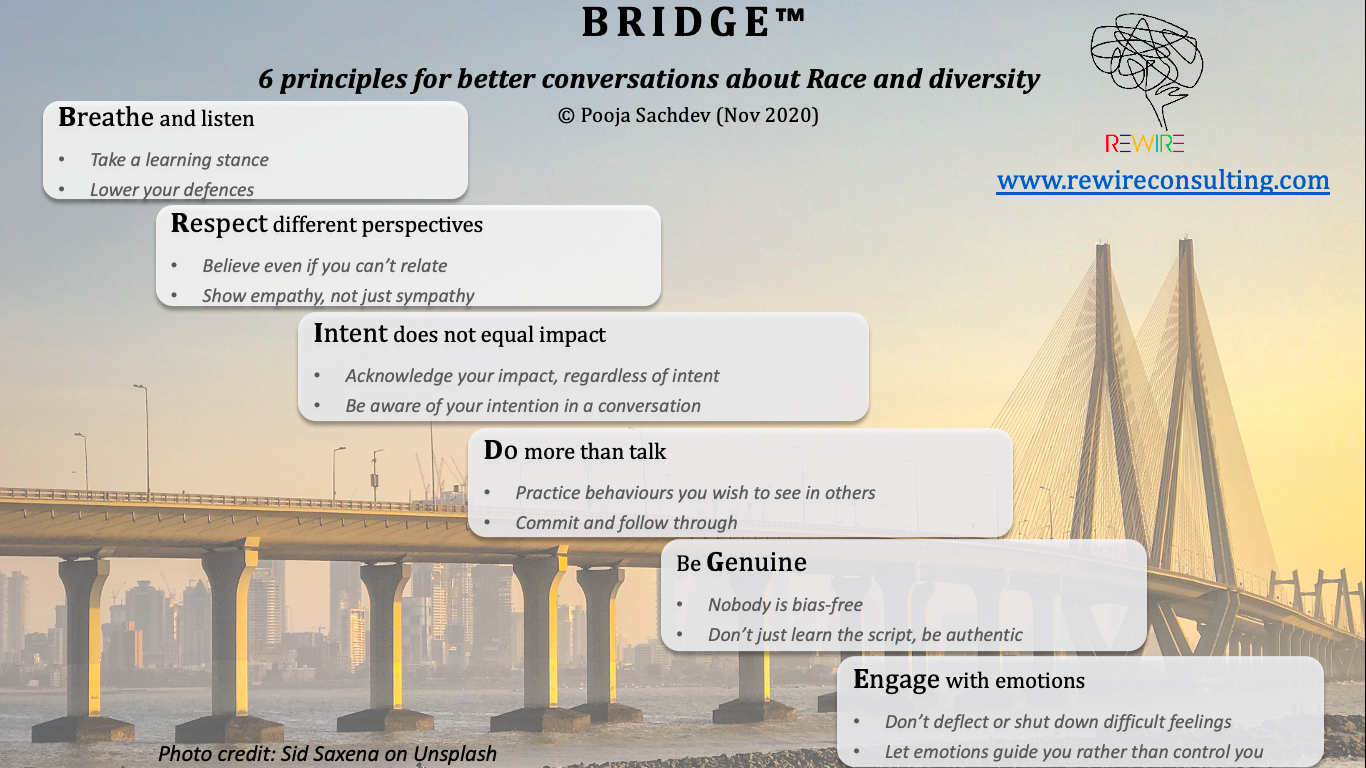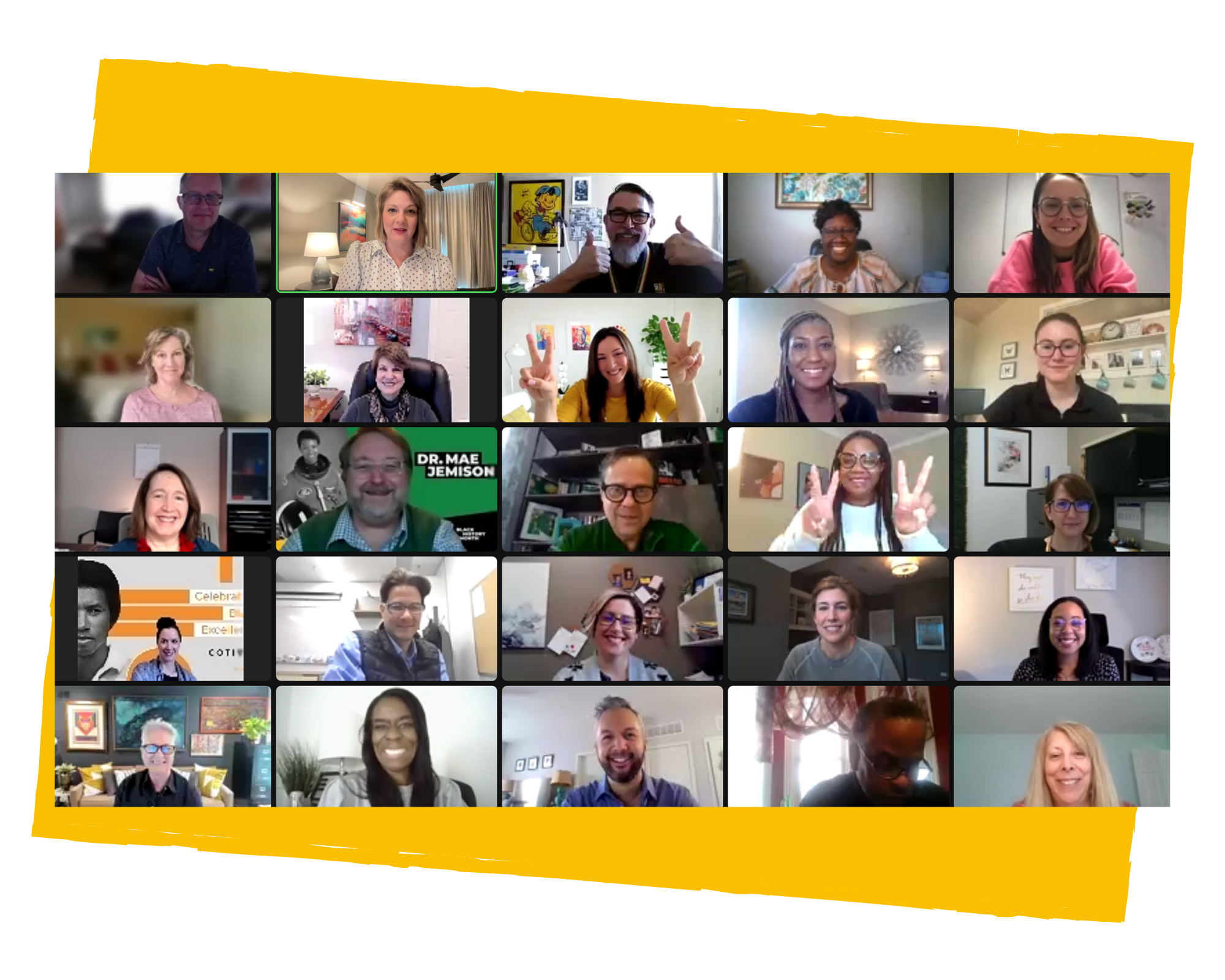Dr. Martin Luther King once said, “People fail to get along because they fear each other; they fear each other because they don’t know each other; they don’t know each other because they have not communicated with each other.”
With the mission of bridging the racial divide that separates us, trust in each other is necessary. The only way for it to begin is by us, everyday people, taking action together, side by side. It’s through acts of vulnerability that trust is created and community can flourish.
In a polarized world, it’s important that we engage in courageous conversations around topics where we have had different lived experiences. One such topic is race – a social construct created to divide us by appearance, class, and cultural backgrounds, whereby people are treated differently according to hierarchy.
So, how do we have conversations about race?
We first need to be conscious of our own journey towards understanding race.
The National Museum of African American History & Culture suggests asking yourself five questions before engaging in conversations around race.
- When were you first aware of your race?
- What do you remember from childhood about how you made sense of human differences? What confused you?
- What childhood experiences did you have with friends or adults who were different from you in some way?
- How, if ever, did any adult give you help thinking about racial differences?
It’s important that we ask ourselves these questions as we begin to think about race. Some of us have been aware of race from our childhood, some have not considered it at all. Acknowledging these differences and recognizing them can help move us forward together — the first step is to be open to having conversations where we can reflect on our experiences with race, as a collective.
These conversations allow us to suspend judgment and actively listen to other’s lived experiences – we will never understand what it means to be another person unless we are willing to listen to their story. While race is a construct created to divide us, we can come together to explore our diverse experiences. In doing so, we will find a common thread that connects us – we’re all human.
Now – let's move on to the conversation piece
Talking about race is necessary for bridging the divide and building the Beloved Community (Beloved Community meaning a community in which everyone is cared for and free from poverty, hunger and hate.) It helps celebrate the diversity of humanity and uplift historically marginalized people and communities.
Pooja Sachdev, founder of Rewire Consulting, outlines six principles for having better conversations about race called B-R-I-D-G-E:

Based on research, experience, and coaching conversations, Pooja Sachdev's principles help people talk about race in a way that is empathetic, with the goal of coming to a place of mutual understanding and respect.
"Trying to bridge the divide does not necessarily mean changing our beliefs or compromising our values, it means listening and trying to understand instead of shutting down or shutting out. It means engaging with respect, humility and a genuine intent to learn where the other is coming from rather than with an intent to dismiss or put down." — Pooja Sachdev
The bridge that unites us
At Inclusivv, we believe that to change a culture, you must change access to the stories you encounter – and that's why having conversations around race can open the door for change. In celebration of Black History Month, Inclusivv hosted a conversation we created in partnership with The King Center around race: Bridging the Racial Divide.
As part of our Inclusion & Belonging Membership Journey, the conversation explores how we can come together to bridge the racial divide and build the Beloved Community.
On February 15, we hosted the conversation with our Inclusivv members and welcomed a very special guest, Bonita Hampton Smith, the Chief Operating Officer at The King Center, who gave an inspiring speech about nonviolent communication.
.png?width=770&height=616&name=welcoming%20america%20(5).png)
We got chills as we listened to her give the definition of nonviolence as, "a love-centered way of thinking, speaking, acting, and engaging," and the Beloved Community as, "a state of heart and mind, a spirit of hope and goodwill that transcends all boundaries and barriers and embraces all creation."
For 60 to 90 minutes, we actively engaged with one another's stories of agape love, experiences of stepping outside comfort zones to bridge a divide, and ideas around creating a world free from racial division. We left feeling inspired, connected, and committed to building the Beloved Community.
.png?width=770&height=616&name=welcoming%20america%20(1).png)
A story from a member
"There is so much work that needs to be done to break the racial divide. However, I am delighted to see and hear people from different backgrounds and cultural and racial ethnicities coming together in discussion to seek ways to begin the process of bridging what has been historically used to divide humanity: race. I would LOVE for this discussion to continue on this platform and I am glad to be here.”
.png?width=2000&height=1600&name=welcoming%20america%20(2).png)
What our members are saying
"The training[conversation] was well thought out and interactive, and it was nice to talk with others about their experiences."
"The authenticity and transparency was amazing!"
"It's time to take action... this platform is doing that."
"I think it's great to have a safe space to share your thoughts, feelings and experiences."
"I think it's important for people from various backgrounds to engage in these conversations."
"I am so empowered to continue to learn and take action in my role as DEI Director, and in my personal life as well."
.png?width=2000&height=1600&name=welcoming%20america%20(3).png)
If you're interested in hosting your own Bridging the Racial Divide conversation, we offer it for free here. Or, if you're interested in joining our Inclusivv Membership (as an individual or team) to be a part of a community committed to diversity, equity and inclusion, click here.
For further reading
- The King Center's philosophy on nonviolence and the Beloved Community
- The 10 R's of Talking About Race: How to Have Meaningful Conversations by NetImpact
"Sometimes you have to get in the way. You have to make some noise by speaking up and speaking out against injustice and inaction." — John Lewis
Note from the author
I want to thank my editors and collaborators, Danielle Quesenberry and Kayli Moody, for their contributions to this piece.



.png?width=950&height=1022&name=Belonging%20(4).png)